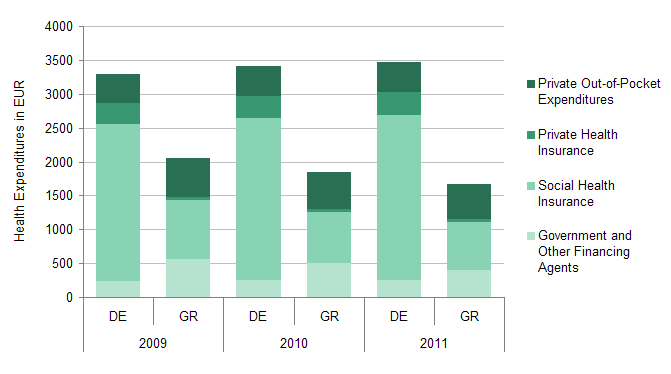Cost containment hits the Greek health economy
Kostendämpfung trifft die griechische Gesundheitswirtschaft
| The cost-containment policy prescribed by the Troika for the Greek health care system seriously hits not only the Greek health economy, but also the national economy. Germans would have considered the benchmark keeping public health expenditure as percent of GDP at or below 6 as nonsense. In reality, intended to reduce public debts and restore economic growth, the cost-containment has reached the opposite impact. Challenges ahead are not only to cope with the loss of medical and paramedical professions, increasing uncertainties to invest in the health sector, but also to develop health expenditure norms that can be used in health policy. | Die Kostendämpfung, die dem griechischen Gesundheitssystem durch die Troika zugemutet wurde, traf nicht nur die griechische Gesundheitswirtschaft sondern auch die Wirtschaft im Allgemeinen. Als Benchmark setzte die Troika eine öffentliche Gesundheitsausgabenquote von 6% und geringer an. In Deutschland hätte man dies als Unsinn abgetan. Tatsächlich erreichte man durch die Kostendämpfungspolitik das Gegenteil. Die zukünftige Herausforderung ist nicht nur mit den Folgen dieser Kürzungen fertig zu werden und die Fachkräfte zu sichern, sondern auch die Entwicklung von Ausgabennormen für die Gesundheitspolitik. |
Health care depression
Started in 2010, the Greek Government continues to implement the comprehensive modernization of the health care system with the objective of keeping public health expenditure at or below 6 percent of GDP, while maintaining universal access and improving the quality of care delivery [1]. In practice, this health care policy has led to the deepest depression of the health economy.
While nominal gross domestic product declined by –3.9 and -6.1% in 2010 and 2011, health expenditures dropped down by –10,1 and –9,9%. As a consequence, health expenditure ratios as per cent of GDP already fell in 2010, and further in 2011.
Cost-containment measures implemented in 2010–2011 included cuts in public sector salaries, bonuses, and allowances, and steps to reduce health care spending on drugs. Other measures included cuts in capital spending and a reorganization of subnational governments (Kalikrates) [2].
Greece ranks far below the German health care expenditures per capita with spending of 1,662 EUR in 2011, compared with 3,474 EUR in Germany.
Fig. 1: Public / private mix of health-expenditure financing, 2009 - 2011, Germany (DE) and Greece (GR)

Public / private Mix
Fig. 1 presents the total current health expenditure by financing agency. The data refer to the financing from the domestic economy sectors (General Government excluding Social Security Funds, SSFs, households, private insurance companies and other expenditures by NGOs, the Church, etc.) by health care activity (in-hospital treatment, rehabilitation services, long-term care, pharmaceutical and medical products, etc.)[3].
Troika demanded better accounts
Progress in accounting was one of the key conditions of the Troika. The standard methodology for health accounting, the System of Health Accounts (SHA) was implemented by the National and Kapodistrian University of Athens (through CHESME, Center for Health Services Management and Evaluation-Faculty of Nursing) with support of BASYS. In April 2013, the Hellenic Statistical Authority (ELSTAT) published for the first time statistical data for Health Expenditures at national level on the basis of SHA. Figures exhibit huge differences as compared to former compilations published by the OECD.
Outlook
An important policy impetus took place in March 2012 with the adoption of the new healthcare law (Law 4052/2012) directed at
- reducing and thereafter controlling expenditure in the pharmaceutical sector;
- instituting a single universal social health insurance fund – EOPYY (National Organisation for the Provision of Health Services), and
- reforming the hospital sector.
Full implementation of those measures will likely produce further cuts in 2012, 2013, and 2014.
Conclusions
Cost-containment policies recommended by the international organisations for the Greek health systems are full of contradictions both from health perspectives and economic policy.
The IMF has criticized the EC, that with the focus of its reforms more on compliance with EU norms than on growth impact, was not able to contribute much to identifying growth enhancing structural reforms. But, there is no commonly agreed norm such as public health expenditure as percent of GDP at or below 6.
References
[1] EUROPEAN COMMISSION, (2012), The Second Economic Adjustment Programme for Greece, First Review - December 2012, Ecfin, Occasional Papers 123.
[2] IMF, (2013), Greece: Ex Post Evaluation of Exceptional Access under the 2010 Stand-By Arrangement, June 2013, IMF Country Report No. 13/156, Washington D.C.
[3] ELSTAT , (2013), Health Expenditures –System of Health Accounts 2009-2011, (Preliminary estimates), Press release, Piraeus, 24 April 2013.
Authors
Markus Schneider, Lycourgos Liaropoulos*, Olga Siskou*
* CHESME - Center for Health Services Management and Evaluation. Faculty of Nursing, National and Kapodistrian University of Athens
A PDF-Version of this article you will find here.



